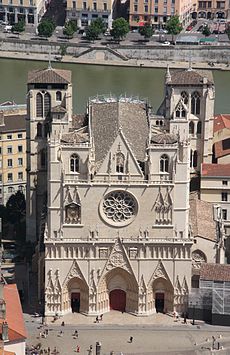Bishop of Lyons
|
Metropolitan Archdiocese of Lyon Archidioecesis Lugdunensis Archidiocèse de Lyon |
|
|---|---|

|
|
| Location | |
| Country | France |
| Territory | Rhône, Loire |
| Ecclesiastical province | Lyon |
| Coordinates | Coordinates: 45°45′39″N 4°49′37″E / 45.76083°N 4.82694°E |
| Statistics | |
| Area | 5,087 km2 (1,964 sq mi) |
| Population - Total - Catholics |
(as of 2013) 1,912,441 1,246,000 (65.2%) |
| Information | |
| Denomination | Roman Catholic |
| Rite | Latin Rite |
| Established | 150 |
| Cathedral | Primatial Cathedral of St John the Baptist in Lyon |
| Patron saint |
St Irenaeus of Lyon Saint Pothinus |
| Current leadership | |
| Pope | Francis |
| Metropolitan Archbishop | Cardinal Philippe Barbarin |
| Auxiliary Bishops | Jean-Pierre Batut Patrick Le Gal |
| Map | |
 |
|
| Website | |
| <lyon.catholique.fr | |
The Roman Catholic Archdiocese of Lyon, formerly the Archdiocese of Lyon-Vienne-Embrun, is a Roman Catholic Metropolitan archdiocese in France. The current Cardinal Archbishop is Philippe Barbarin. He is the successor of Saint Pothinus and Saint Irenaeus, the first and second bishops of Lyon, respectively, and is called Primate of the Gauls. It is one of the more prestigious archbishopships within the French church, and its holder is usually promptly made Cardinal.
The "Deacon of Vienne", martyred at Lyon during the persecution of 177, was probably a deacon installed at Vienne by the ecclesiastical authority of Lyon. The confluence of the Rhône and the Saône, where sixty Gallic tribes had erected the famous altar to Rome and Augustus, was also the centre from which Christianity was gradually propagated throughout Gaul. The presence at Lyon of numerous Asiatic Christians and their almost daily communications with the Orient were likely to arouse the susceptibilities of the Gallo-Romans. A persecution arose under Marcus Aurelius. Its victims at Lyon numbered forty-eight, half of them of Greek origin, half Gallo-Roman, among others Saint Blandina, and Saint Pothinus, first Bishop of Lyon, sent to Gaul by Saint Polycarp about the middle of the 2nd century. The legend according to which he was sent by Saint Clement dates from the 12th century and is without foundation. The letter addressed to the Christians of Asia and Phrygia in the name of the faithful of Vienne and Lyon, and relating the persecution of 177, is considered by Ernest Renan as one of the most extraordinary documents possessed by any literature; it is the baptismal certificate of Christianity in France. The successor of Saint Pothinus was the illustrious Saint Irenaeus (177-202).
...
Wikipedia
